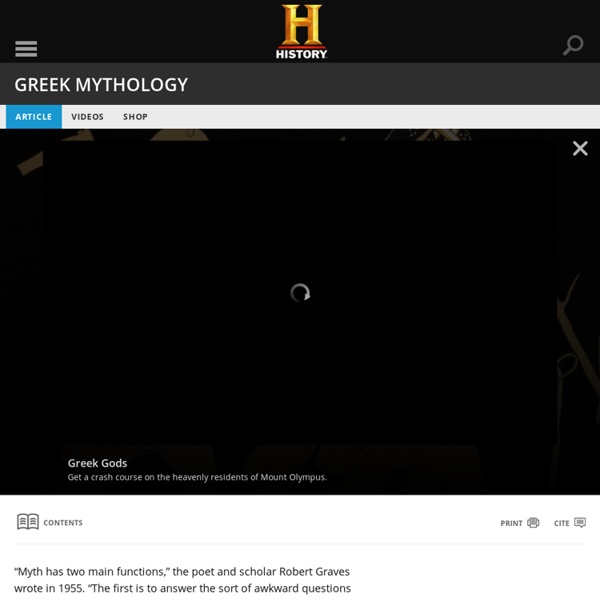Greek Mythology - Ancient History
In Greek mythology, there is no single original text like the Christian Bible or the Hindu Vedas that introduces all of the myths’ characters and stories. Instead, the earliest Greek myths were part of an oral tradition that began in the Bronze Age, and their plots and themes unfolded gradually in the written literature of the archaic and classical periods. The poet Homer’s 8th-century BC epics the Iliad and the Odyssey, for example, tell the story of the (mythical) Trojan War as a divine conflict as well as a human one. Around 700 BC, the poet Hesiod’s Theogony offered the first written cosmogony, or origin story, of Greek mythology. Later Greek writers and artists used and elaborated upon these sources in their own work.
How did the Greek Gods affect the Greeks daily lives?: The Greeks to the Greek Gods
This page is all about what the Greeks did other to worshipping the gods in temples and seprate places to worship the gods and how there views changed of the gods. Did the Greeks have any kind of festivals to worship the Greek Gods? They had annual religous festivals to worship the gods. The Greeks changes worshipping the Greek Gods in many different ways. Did people specifically worship one god more than the other? The Greeks would go to the appropriate god when they were going on a quest or attempting something to try and bring good luck by pleasing the god or goddess.
Greek Gods and Goddesses • Facts and Information
Family tree of the Greek gods
Key: The essential Olympians' names are given in bold font. See also List of Greek mythological figures Notes External links Media related to Family trees of Greek mythology at Wikimedia Commons
Lesson 1: How did Greek mythology shape the lives of Greeks?
Lesson Objectives: Students will be able to *describe how Greek lives were influenced by religion, the arts, and architecture Key Terms to Know Directions: Look up each term in your textbook (pages 154-156) and define each term in your social studies notebook. myth oracle Mt. Greek Mythology Ancient Greeks believed gods and goddesses controlled nature and guided their lives. oracle at the Temple of Apollo at Delphi The ancient Greeks also believed in fate and prophecy (predictions about the future). Watch the video below to learn about the mysteries of the oracle at the Temple of Apollo at Delphi. Oracle at Delphi Ask Yourself Why do you think the ancient Greeks believed in so many gods and goddesses? Activity Watch the story of Perseus and Medusa. Perseus and Medusa Why is Perseus sent out to kill Medusa? Homework Imagine you were alive in ancient times. Gods & Goddesses Click below for the next lesson Lesson 2: How did the arts influence the values of the ancient Greeks? It's All Greek To Me!
Ancient Olympic Games, First Olympics in Olympia
According to historical records, the first ancient Olympic Games can be traced back to 776 BC. They were dedicated to the Olympian gods and were staged on the ancient plains of Olympia. They continued for nearly 12 centuries, until Emperor Theodosius decreed in 393 A.D. that all such "pagan cults" be banned. Olympia Olympia, the site of the ancient Olympic Games, is in the western part of the Peloponnese which, according to Greek mythology, is the island of "Pelops", the founder of the Olympic Games. The Games and religion The Olympic Games were closely linked to the religious festivals of the cult of Zeus, but were not an integral part of a rite. Victory Ceremonies The Olympic victor received his first awards immediately after the competition. The official award ceremony would take place on the last day of the Games, at the elevated vestibule of the temple of Zeus.
Related:
Related:



